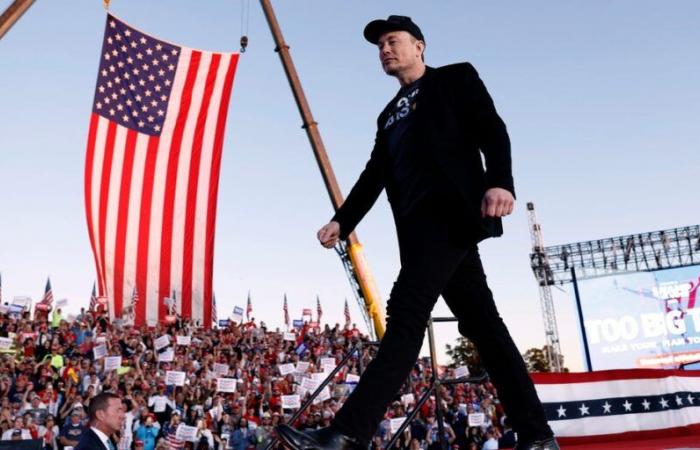- Elon Musk has gone all in on supporting former President Donald Trump for reelection.
- Musk could gain influence at the federal level if Trump is elected president.
- It’s unclear what a Harris administration would mean for Musk and his business empire.
The stakes are high for Elon Musk and his business empire this election season.
Since announcing his endorsement of former President Donald Trump in Julythe billionaire has consistently used X to voice his support for the Republican Party and has taken the stage with Trump during at least two rallies.
He’s hosted his own series of political “talks” and invested more than $130 million in pro-Trump efforts this year. He’s also committed to a daily $1 million giveaway to swing-state registered voters who sign his petition in support of free speech and the right to bear arms.
Musk’s actions beg the question: What does the billionaire stand to gain from a Trump presidency?
Potentially, a lot.
Musk under Trump
Many of Musk’s companies depend largely on federal approvals, regulations, subsidies, or contracts — and Trump has promised a lighter regulatory environment with plans to lower corporate and personal taxes.
If Trump secures the presidency, University of California Berkeley business and public policy professor Francesco Trebbi told Business Insider that Musk could benefit from “installing key personnel within the public administration.” This could secure him valuable connections that extend beyond the next four years, he said.
Trump has already incorporated some of Musk’s policy proposals into his campaign, with plans to establish a government efficiency commission led by Musk. Trump has said the commission would conduct a “complete financial and performance audit of the entire federal government” and make suggestions for “drastic reforms.”
Musk proposed firing a number of federal workers at a Pennsylvania town hall on October 18.
“What the hell do you need 428 agencies for,” Musk recently said at a rally in Pittsburgh. “Like why do you even need 100?”
Erik Gordon, area chair of entrepreneurial studies at the University of Michigan’s Ross School of Business, said a Trump presidency might also result in less regulator scrutiny. That could give Musk “more freedom to develop advanced technologies — one of his favorite things to do,” Gordon said.
Tesla is at a pivotal moment, with investors eyeing Musk’s pledge to secure approval for fully autonomous vehicles in Texas and California. However, ongoing investigations into Tesla’s self-driving technology by government agencies, including the National Highway Traffic Safety Administration, could set back the company’s autonomous plans.
During a recent earnings call, Musk suggested that if there were a government efficiency commission, he would help push the state-by-state approval process forward with a “federal approval process for autonomous vehicles.”
For SpaceX, Trebbi said a Trump presidency may help the company procure large contracts with the Department of Defense. That could help it keep its edge against rivals like Blue Origin.
Musk under Harris
While Musk could gain power, government contracts, and looser regulations under Trump, it’s unclear how he might be impacted under a Harris administration.
A key policy on the minds of many business leaders is Harris’ proposed tax plan. She aims to raise the corporate tax rate from 21% to 28% — a move that Bank of America estimates could decrease earnings by 5%. That, combined with the possibility of stricter regulations, could impact a number of companies, including those belonging to Musk.
Gordon said Harris could introduce new safety regulations or enact tax credits for EVs or AVs that favor competitors.
For X, which Musk has branded as the platform for freedom of speech, Gordon said a Harris administration could pressure it to ban material labeled as “misinformation.” However, Gordon said X would most likely win in courts under the First Amendment.
Tevi Troy, a senior fellow at the Bipartisan Policy Center, said it’s unlikely — and most likely illegal— that Harris would send orders to target Musk. However, it’s possible that Musk may experience “selective enforcement,” Troy, who is also a former senior White House aide, said.
“One would hope that governmental units would be immune to political pressures,” Joan MacLeod Heminway, a law professor at the University of Tennessee, told BI. “But people in those units are humans and may inadvertently scrutinize proposals coming from entities owned or controlled by Elon Musk.”
It’s also possible nothing would meaningfully change for Musk under a Harris administration.
“We don’t have any strong indication that Harris wants to greatly expand the regulatory burdens,” Cary Coglianese, University of Pennsylvania law professor and director of the Penn Program on Regulation, told Business Insider.
Tom Narayan, an analyst at RBC Capital Markets, said a Democratic Administration could be better for Musk because Harris supports the Inflation Reduction Act and producing in Mexico, which Trump has spoken out against.
The IRA provides substantial benefits to Musk, including a $7,500 tax credit for new EVs, which aids Tesla. It also offers tax credits for solar installations.
Karoline Leavitt, the Trump campaign’s national press secretary, told BI that if elected, President Trump will support the auto industry, “allowing space for both gas-powered cars AND electric vehicles.” However, he plans to terminate the Green New Deal and rescind unspent funds from the Inflation Reduction Act in an effort to “rapidly defeat inflation and bring down all prices,” Leavitt said.
Musk is playing a risky game
Given Musk has said he’s supported Democrats in the past, Trebbi said he may be aligning himself with Trump to secure government support.
“I see Musk’s realignment with the Republican Party as a risk hedging strategy, designed to preempt government regulation/maintain government support no matter who wins in November,” Trebbi said.
Coglianese also said its possible Musk sees himself as the one who can “turn around the federal government,” much like his approach to acquiring Twitter.
“It’s also totally conceivable that he just sees himself as someone who can be a savior,” Coglianese said.
Coglianese said the strategy to align himself with Trump is risky though.
“He’s banking on a president who will want to or be willing to repay Musk for his loyalty,” Coglianese said, adding that it’s not always clear that even his strongest supporters get everything they want.
Carl Icahn secured some EPA relief while advising Trump during his first term, but his tenure ended in controversy, Coglianese said. The billionaire investor resigned from his unpaid role amid criticism over potential conflicts of interest.
Other cases have ended more favorably. Trump previously said that Tim Cook was the only CEO who called him directly when he had a problem. The Apple CEO secured an iPhone tariff exemption with the former President.
“There are ethical rules mandating compliance with various types of obligations, including conflict-of-interest reporting, for certain types of government positions,” Heminway said. “Elon Musk may not want to take on these obligations.”







